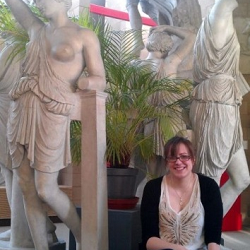 Lex Rutterford is on the 4-year course:
Lex Rutterford is on the 4-year course:
In what university course could you, in the space of a single week, study poetry, politics, gender issues, war, prehistory, oratory, sculpture, the evolution of language, and the earliest theory of atoms? I think it is fairly safe to say that such a mix is unique to Classics. And the crowning glory of the four-year course, is that you learn two languages, in two years, from scratch, taught by world experts. As a 6th former making my university applications, I wondered if I was the right 'type' for Classics, but now I realise there's no such thing. With a willingness to learn, a passion for the ancient world, and the amazing support you receive at Cambridge, the four-year course can give you access to so many things you've never had the chance to study before. I can't pretend it's not a challenge, but it’s definitely an enjoyable one.
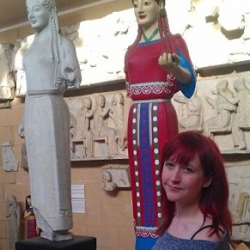 Kerry Higgins is also on the 4-year course. She says:
Kerry Higgins is also on the 4-year course. She says:
Studying the 4-year course at Cambridge has opened up a whole new world to me. Literally. It's challenging, but the course really is something unique and one to be proud of studying. You get the opportunity to study Latin and Greek to the same level as people who've been doing it for years. It's so rewarding for these ancient texts, previously inaccessible, to unfold before your eyes as you gradually get a grip on the language.
But you don't just get that: art and architecture, philosophy, philology and history are also all wrapped up into one little/HUGE Classics bundle (as I said: challenging!). You'll sit down one morning and translate Plato's concept of the soul, then next you'll be panicking about dropping the ancient Mycenaean pot that's in your hands!
It really is an incredible, fascinating course and something I never thought I'd be doing. And your teachers give you all the support you need.
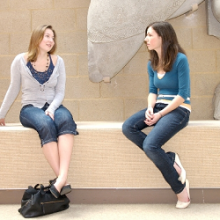 Since they are at the same college, Natalia Kim and Emily Schurr are regularly supervised together. They write:
Since they are at the same college, Natalia Kim and Emily Schurr are regularly supervised together. They write:
Supervisions have been the most rewarding part of our academic experience of Cambridge. You get a chance to voice your own opinions about issues raised in the lectures - it's a really important thinking process that prevents you from just writing down what other people think. It's also essential to have a balance of contribution between the supervision partners - then you can really get a debate going.
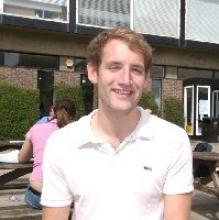 Tom Cheshire took the 3-year degree. These were his thoughts at the beginning of his second year:
Tom Cheshire took the 3-year degree. These were his thoughts at the beginning of his second year:
As daunting as starting at Cambridge seemed - especially after a gap year – there was so much to do and find out, and so many people to meet, that there simply wasn’t the time to feel intimidated. It was only in the winter holidays that I could take stock and reflect on one of the most enjoyable terms of my life. Everyone quickly finds something in the course that appeals to them in particular and you’d be amazed at how much you learn over a year, especially considering that in our very first ancient history lecture the majority of us couldn’t locate Athens on a map!
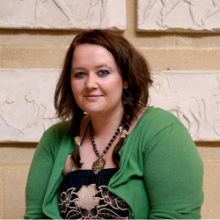 Naomi Hatton was among the first cohort to graduate from the four-year course. She writes:
Naomi Hatton was among the first cohort to graduate from the four-year course. She writes:
The four-year course in Classics has been the most exhilarating thing I have ever done. I had long been obsessed with the classical world but - having done no Latin or Greek before - I sometimes found it a real challenge. The four year course, and the opportunity it has provided to learn the Classical languages, has completely redefined and expanded my knowledge of the Classical world.
Anyone who has not had the opportunity to study Latin and Greek at school but loves Classics should feel confident that, although challenging, this course is fun, stimulating and achieves real results. The value of the course is reflected in the fact I will be staying at Cambridge to do the Classics MPhil!
